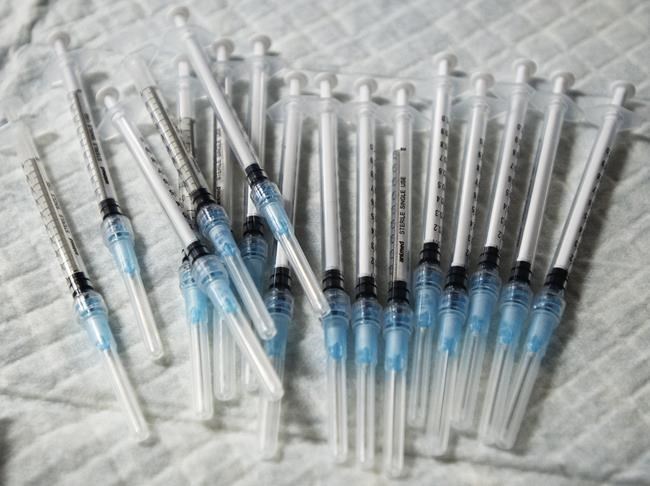OTTAWA — The United States unveiled details of its first global donations of COVID-19 vaccines Thursday, with plans to ship 19 million doses through the COVAX vaccine-sharing alliance, and another six million doses directly to neighbours, including Canada, and countries experiencing pandemic surges.
It is not clear yet how many doses Canada would be offered by the United States, if Canada would accept them at this point, or which vaccine would be sent.
The offer comes as Canada's vaccine rollout is nearing the best in the world, and at the same time as pressure is mounting on the Canadian government to start sharing some of its COVID-19 vaccines as well.
A coalition of almost three dozen Canadian aid groups, faith-based organizations and global development advocates called on Prime Minister Justin Trudeau to immediately share four million doses of vaccine — one for every 10 doses Canada expects to receive by the end of June.
"By August, Canada will have enough to fully vaccinate its entire population," reads the statement signed by 32 groups, including the Canadian arms of One, UNICEF, World Vision, the Mennonite Central Committee, Canadian Council of Imams and the Anglican Council of Indigenous People.
"Canada has ordered more doses per capita (more than 10) than any other country and therefore has a responsibility to share with the world."
Canada expects to have 40 million doses delivered by the end of this month and more than 100 million by the end of September.
As of Thursday, Canada had given one dose to at least 22.4 million people, more than 59 per cent of the entire population. After a slow start with limited deliveries, Canada's supplies have been flooding in since April, and on Wednesday, Canada eased above the United Kingdom, in terms of people with at least one dose.
But wealthy nations are leaving the rest of the world in their vaccine dust. About two billion doses of vaccine have been administered worldwide, more than eight in 10 of them in wealthy countries, and only 0.2 per cent in low-income nations.
Canada has given 2.5 times as many doses per capita as the global average.
International Development Minister Karina Gould said Canada will share doses eventually but doesn't have any excess vaccine at the moment because the country is still trying to get every Canadian immunized.
Speaking at a Senate committee Thursday, she said "we're not quite at the point to announce that yet" but said news on donations could be coming shortly.
On Wednesday, Canada doubled its financial commitment to $440 million to help the global vaccine sharing alliance known as COVAX buy doses directly from manufacturers.
Dr. Srinivas Murthy, a critical care pediatric specialist in Vancouver with a research focus on pandemic preparedness, said he just doesn't understand why Canada will not commit to sending doses now too.
Murthy said Canada's financial commitment is fine but that isn't going to help COVAX get doses to the rest of the world now, because wealthy countries like Canada have snapped up most of the vaccines available.
"It's vaccines, not money at this point in the pandemic that are required globally," said Murthy.
Canada and the United Kingdom are the only two G7 nations not donating doses directly to COVAX and taking doses from the alliance through the self-financing mechanism.
COVAX was established as a program to try and ensure the limited supply of COVID-19 vaccines were shared equitably around the world, and offered wealthy countries the chance to buy doses through COVAX and donate money to help buy doses for 92 low and middle income countries that otherwise couldn't buy all the vaccines they needed.
Canada spent $220 million to buy doses from COVAX for itself, and the U.K. spent about C$121 million. Canada has received almost one million doses of the Oxford-AstraZeneca vaccine from COVAX, and the U.K. expects a shipment of about half a million Pfizer-BioNTech doses this month.
The other G7 nations aren't using the self-financing route, and are donating doses directly to COVAX already. France, Germany and Japan are promising 30 million doses, and the U.S. is starting with at least 19 million this month, with the expectation of more.
— With files from James McCarten in Washington, D.C.
This report by The Canadian Press was first published June 3, 2021.
Mia Rabson, The Canadian Press



